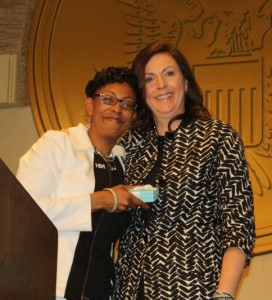“We don’t have to have a mentality of scarcity”, CEO, Healthcare Businesswomen’s Association
Healthcare has been big news for the last few years with changes in laws, insurance coverages, and the blurring of lines between different aspects of healthcare. Those changes have created confusion for patients, but they have also led to confusion within the industry. The pathways to management within healthcare are not as defined as they once were, leaving many women in the healthcare business unsure how to navigate to attain their career goals. Fortunately, the Healthcare Businesswomen’s Association, HBA, is here to provide a compass.
 I spoke with Laurie Cooke, CEO of the Healthcare Businesswomen’s Association, to find out more about their organization and the services they provide to women in the healthcare industry.
I spoke with Laurie Cooke, CEO of the Healthcare Businesswomen’s Association, to find out more about their organization and the services they provide to women in the healthcare industry.
Healthcare Businesswomen’s Assocation (HBA) provides education and support to women in all areas of healthcare. But what sets HBA apart from others in the industry?
Healthcare Businesswomen’s Association intentionally paints their role in the industry with a very broad brush. There are no longer the separations between the various elements of healthcare that there once were. “Everything is interconnected and interrelated,” remarked Cooke. A project manager in a pharma company and one in biotech will have similar needs.
The strategy works. When Cooke came aboard as CEO in April 2006, HBA had fewer than 2,000 members. They have grown to over 32,000 women and men today. (They target women but also welcome men.) Their goal for next year is HBA at 50K.
Women tell HBA they wish they had gotten involved sooner. A major factor in their expansion has been timing: women desire to move into more management and executive positions and companies see the benefits for having more women in those positions. HBA, for their part, works from the bottom up and the top down—with women directly and with those companies—to help both ends achieve their goals. Most organizations focus on one side of the equation of the other, not both.
HBA offers programming for members and non-members in four major areas: networking, education, mentoring programs, and recognition.
Networking
HBA helps women to build their network by understanding why and how. Then provide access to other women leaders. Cooke calls the method, “Radical Hospitality.” When a woman attends an HBA event, she feels welcomed, people really want to help, and change the mindset. Women come to HBA with stories of the horrible female bosses they have had. “We want to show that there is a different way. We don’t have to have a mentality of scarcity,” Cooke said.
HBA believes women need to learn how to do it well without doing it all. That requires them to learn to ask for help from competent mentors. A network can sometimes feel like an abstract concept, so how do you know when you have one? When a woman needs help with a problem or needs help finding a contractor at work AND she knows whom to call to get advice and guidance, then she has a solid network. HBA teaches women to ask for help and helps them to expand their network. Aside from the support a network provides, female job seekers also can rely on their network to find them new job opportunities if they lose a job or need a new challenge. “You don’t wait until you’re thirsty to build a well,” said Cooke.
Education
They host over 300 events annually across the US and Europe through the local chapters. HBA holds events live and virtually to reach the greatest audiences. The goal of the events is education; they further industry knowledge and educate in the areas of basic management skills like finance, negotiations, and mentorship and coaching.
Mentoring Programs
HBA connects leaders with a desire to give back with women who want to become leaders or to improve their leadership skills.
Recognition
One of the challenges we face is that women do not have the same roll models as men. They do not know whom to emulate. Cooke said, “I grew up with women who had the little bow ties and suits and they were trying to model themselves in terms of male leaders.” HBA is trying to find as many great female role models as they can to assist women in healthcare to be authentic and to grow more rapidly into leadership roles. “By recognizing successful women in the industry, they are bringing healthcare workers a new idea of what authentic female leadership can be. A female approach to leadership that flows from a woman’s strengths is much more powerful than a woman who adopts a male leadership style. Women don’t have to be a female in male-inspired attire.
The other half of HBA’s mission is to improve the industry by helping organizations to better understand and meet the needs of their empoyees. HBA assists companies to see alternate ways for creating an environment that better facilitates women’s advancement. “It isn’t about getting every woman to the corner suite—we wouldn’t say that about men either–but really is about leading from where you are, having the best impact you can be making, based on who you are,” Cooke said. One of the goals is to bring everyone to the table and facilitiate discussion while teaching peoples how to mentor more successfully.
To that end, HBA has acquired over 100 corporate partners that love to open their doors and show people what goes on at “Company X.” HBA also creates a collaborative environment for those companies to share information with each other for best practices, so they can be better companies for the women who work for them.
HBA plans evening events predominately, hosted by their corporate partners that focus on specific areas of interest. Their events are open to members and non-members alike in an effort to reach as many healthcare professionals as possible. Topic are very clearly defined to help women determine which events best suit their needs. Every event includes some networking and sharing. Virtual programs range from 1-hour to 6 weeks in duration and are offered on a variety of topics. Many of the virtual programs enable those people in professionals, such as healthcare sales, that normally get little interaction with their colleagues to connect and learn with others. For those women who want a “full immersion” experience, HBA also offers 2 ½-day conferences; by the time they leave, they will be motivated and ready to help others as they lead.
Cooke seems an ideal CEO for Healthcare Businesswomen’s Association, but her journey to her current position was more of a rambling brook with plenty of bends than a straight and narrow path. She quickly points out that we often make assumptions about career paths, “I think that everyone thinks that somebody else’s career path is very structured…and then they find out that’s not the way the world tends to work.” She now shares her own path with other women so they can begin to see the opportunities in their own careers.
Cooke started in microbiology at a bench hoping to find cures for disease. She quickly realized she is a people person and this was likely not the best use of her skills. So, she migrated to pharmacy where she enjoyed “the expanded nature and working with people.” Cooke’s ability to influence more people in pharmacy suited her personality.
As luck and fate would have it, Cooke met her husband, who is British, and moved to England where her eight years of education and license were not accepted. Disliking the idea of tackling more education after already devoting eight years to school, she instead ventured into the pharmaceutical industry where her microbiology and pharmacy backgrounds were a solid fit.
Along the way, the opportunity arose to get a post-graduate diploma in England in Software Engineering Management. At the time the new degree felt a lot like a detour. However, Cooke now advises women to take leaps like hers more freely. That additional educational arm, she said, changed who she is and how she leads.
When her husband accepted a job transfer to Philadelphia, Cooke set out to find herself a job closer to home that would expand her reach and impact. What she found—in a newspaper advertisement of all places—was an upper-level position at a non-profit. Cooke shared, “When you are dealing with the public in an association, you are dealing with the customer everyday.” A non-profit was the perfect place for her to impact people’s lives in the way she had always desired. Ultimately, she arrived at the Healthcare Businesswomen’s Association.
In addition to learning how to build a network and to stay educated about changes in their field, Cooke wants all women, not just women in healthcare, to remember two things:
“Understand what really motivates you. For me, it was really about impact.”
“Sometimes you don’t necessarily see how something fits in. Don’t be afraid to grab opporunities.”
21TAGS: Health networking WiB
 Interviewer Interview Prep
Interviewer Interview Prep Impactful Mentees
Impactful Mentees Benefits of a Mentor
Benefits of a Mentor Advice for First-Time Managers
Advice for First-Time Managers Overcoming the 18-month Itch
Overcoming the 18-month Itch Dressing for Your Style
Dressing for Your Style Interview Style Tips
Interview Style Tips Women's Stocking Stuffers
Women's Stocking Stuffers Gift the Busy Traveler
Gift the Busy Traveler Father’s Day Gift Guide
Father’s Day Gift Guide Airport Layover Activities
Airport Layover Activities Traveling & Eating Healthy
Traveling & Eating Healthy Travel Like a Boss Lady
Travel Like a Boss Lady The Dual California Life
The Dual California Life Gifts for Thanksgiving
Gifts for Thanksgiving Summer Reading List
Summer Reading List Top Leisurely Reads
Top Leisurely Reads New Year, New Books
New Year, New Books Life Lessons from a Sitcom
Life Lessons from a Sitcom Oprah, Amy or Amal?
Oprah, Amy or Amal?














